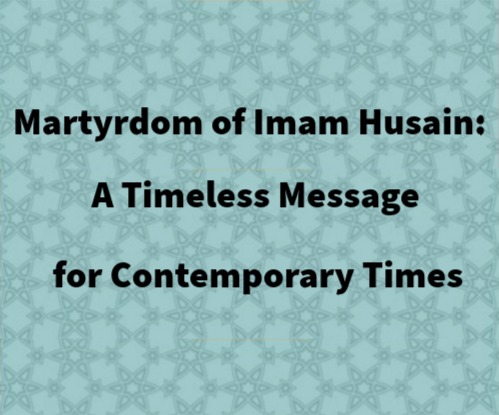By Dr. QutubUddin Abu-Shuja
The martyrdom of Hazrat Husain at the Battle of Karbala in 680 C.E. is a poignant and pivotal event in Islamic history, embodying profound themes of sacrifice, justice, and resistance against oppression. This tragic yet heroic episode transcends time and continues to resonate deeply with millions around the globe. In contemporary times, Imam Husain’s stand against tyranny serves as a powerful symbol of moral and ethical fortitude, offering valuable lessons for today’s socio-political and spiritual landscapes.
Historical Context and the Battle of Karbala
Hazrat Husain, the grandson of Prophet Muhammad ﷺ, stood against the unjust rule of Yazid ibn Muawiya, whose reign marked a significant departure from the principles of justice and piety central to Islamic governance. Imam Husain’s refusal to pledge allegiance to Yazid was rooted in his unwavering commitment to these principles, culminating in the fateful Battle of Karbala.
On the 10th of Muharram, known as Ashura, Hazrat Husain and his small band of supporters, including women and children, faced the overwhelming forces of Yazid. Despite being vastly outnumbered and deprived of water for days, Imam Husain and his companions displayed extraordinary courage and resilience. Their martyrdom epitomized the ultimate sacrifice in the pursuit of truth and justice.
Lessons from Karbala for Contemporary Times
Standing Against Oppression: The message of Karbala underscores the imperative to stand against injustice and oppression, regardless of the odds. Imam Husain’s defiance of Yazid’s tyrannical rule illustrates the importance of resisting unjust authorities and systems. In contemporary times, this principle encourages individuals and communities to challenge oppression in all its forms, be it political tyranny, social injustice, or economic exploitation.
Moral Integrity and Ethical Leadership: Husain exemplified unparalleled moral integrity and ethical leadership. His refusal to compromise his values, even in the face of certain death, highlights the importance of upholding principles over personal gain or safety. Today, leaders and individuals alike can draw inspiration from Imam Husain’s steadfastness, striving to lead with integrity and prioritize the common good over personal interests.
Unity and Sacrifice: The unity and sacrifice displayed by Hazrat Husain and his companions serve as a powerful reminder of the strength found in solidarity. Despite their small numbers, their collective commitment to a righteous cause left an indelible mark on history. In the modern world, this lesson emphasizes the power of unity and collective action in addressing global challenges, promoting social justice, and fostering community resilience.
Empowerment through Faith and Resilience: Hazrat Husain’s unwavering faith and resilience in the face of adversity inspire contemporary believers to draw strength from their spiritual convictions. His story encourages individuals to remain steadfast in their beliefs and values, using faith as a source of empowerment and resilience in overcoming personal and societal challenges.
Universal Appeal of Husain’s Message: Hazrat Husain’s martyrdom transcends religious boundaries, resonating with people of various faiths and backgrounds. His stand against tyranny and his commitment to justice and human dignity are universal values that speak to the conscience of humanity. The annual commemorations of Ashura and the Arbaeen pilgrimage reflect the enduring impact of his sacrifice, drawing millions from diverse backgrounds to honor his legacy and reaffirm their commitment to justice and compassion.
Conclusion
The martyrdom of Hazrat Husain at Karbala is a timeless narrative that continues to inspire and guide individuals and communities across the world. In contemporary times, his message of standing against oppression, upholding moral integrity, fostering unity, and drawing strength from faith remains profoundly relevant. As we reflect on the legacy of Hazrat Husain, we are reminded of our collective responsibility to pursue justice, uphold human dignity, and strive for a world where righteousness prevails over tyranny.
By embodying the principles exemplified by Hazrat Husain, we honor his sacrifice and ensure that the spirit of Karbala continues to illuminate our path towards a just and compassionate world.
[The writer is a US-based psychiatrist.]




